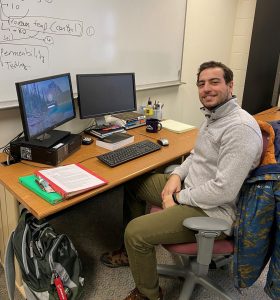Johns Hopkins UniversityEst. 1876
America’s First Research University
As the calendar turned to 2020, Dorukhan Doruk looked forward to May. It would be the first time the civil engineering master’s student at Montana State University would be able to go home to his native Turkey in more than a year, and he was excited to see his parents. But as the novel coronavirus spread throughout Asia and eventually reached the United States, he knew the trip would inevitably be canceled.

From the Montana State campus in Bozeman, Doruk kept tabs on the news in Turkey and found a day-in-the-life report from a COVID-19 ward produced by the BBC. He realized that many of the front-line workers in the video were experiencing separation from their families, just like him.
“They cannot go home to their spouses or children, and they cannot be with their families – but it’s not a choice, it’s their job,” he says. “I saw how important that was to them, and it really affected me.”
Doruk decided to donate to a health care organization heavily involved in COVID-19 response and research efforts to speed the end of the pandemic, both in the United States and around the world. When he heard about Johns Hopkins’ efforts in media reports, he knew the institution was the right place to support.
“I thought, if I cannot do anything but sit at home, I have to do something, I have to do my part,” Doruk says. “Johns Hopkins is one of the oldest [medical] institutions, in the United States and I think you’ve got a good head start in this work.”
Topics: Friends of Johns Hopkins Medicine, Johns Hopkins Medicine, Promote and Protect Health